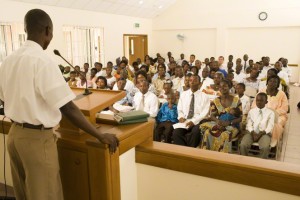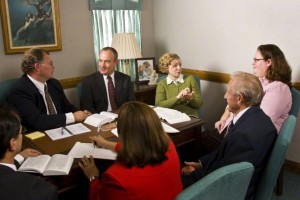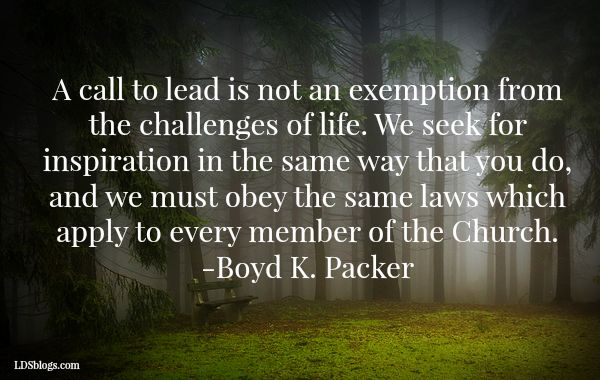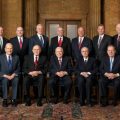The subject of how we follow the prophet is sometimes like discussing politics. You may be getting along famously until you accidentally touch on a sensitive subject and the whole conversation deteriorates into harsh words and wounded feelings. I will be covering basic principles of obedience in this article. I don’t want to step on anyone’s toes, but I realize that sometimes a little toe tapping is almost unavoidable. So for those who may take exception to my words or the intent behind this article, I do not apologize for my words, but I do apologize if it hurts anyone’s feelings.
No prophet has ever taught that any prophet, from any dispensation, was or is without human frailty, either physically or spiritually. We all have our crosses and burdens to carry through this life. But the Lord, who sees the end of all things from the beginning of time itself, has chosen a select handful of leaders to act as His mouthpiece in each generation. These humans, complete with their own package of personal challenges have been chosen by God to be His leaders and His representatives to His family here in mortality.
 God is sure of the performance and faithfulness of our latter-day prophets. In the October, 1994 General Conference, when Howard W. Hunter was sustained as the new prophet, L. Tom Perry gave a talk entitled, “Heed the Prophet’s Voice.” Quoting President Brigham Young, Elder Perry said the following:
God is sure of the performance and faithfulness of our latter-day prophets. In the October, 1994 General Conference, when Howard W. Hunter was sustained as the new prophet, L. Tom Perry gave a talk entitled, “Heed the Prophet’s Voice.” Quoting President Brigham Young, Elder Perry said the following:
“The Lord Almighty leads this Church, and he will never suffer you to be led astray if you are found doing your duty. You may go home and sleep as sweetly as a babe in its mother’s arms, as to any danger of your leaders leading you astray, for if they should try to do so the Lord would quickly sweep them from the earth. Your leaders are trying to live their religion as far as [they are] capable of doing so” (in Journal of Discourses, 9:289).
Elder Perry also said in the same talk:
The Lord surely understood the need to keep His doctrines pure and to trust its interpretation to only one source. Of course, we are all admonished to study and gain as much knowledge as we can possibly obtain in this life. We are encouraged to discuss and exchange ideas one with another to further our understanding. However, the Lord has only one source for the declaration of His basic fundamental doctrines. Even as General Authorities of the Church, we are instructed: “In order to preserve the uniformity of doctrinal and policy interpretation, you are asked to refer to the Office of the First Presidency for consideration [of] any doctrinal or policy questions which are not clearly defined in the scriptures or in the General Handbook of Instructions.”
In this way, conflict and confusion and differing opinions are eliminated.
 There are those who are so averse to being accused of any form of blind obedience that in their efforts to prevent spiritual blindness they have advocated complete spiritual skepticism. They feel they have no obligation to follow the prophet until the Lord has personally revealed the same thing to them that the prophet received. Until that happens, they don’t feel under obligation to heed the counsel. In other words, the counsel isn’t good enough coming from God’s mouthpiece, God has to confirm it through them personally before they will obey. I fear that those who are not willing to obey the prophet won’t have the faith required to get their own confirmation of what the prophet teaches.
There are those who are so averse to being accused of any form of blind obedience that in their efforts to prevent spiritual blindness they have advocated complete spiritual skepticism. They feel they have no obligation to follow the prophet until the Lord has personally revealed the same thing to them that the prophet received. Until that happens, they don’t feel under obligation to heed the counsel. In other words, the counsel isn’t good enough coming from God’s mouthpiece, God has to confirm it through them personally before they will obey. I fear that those who are not willing to obey the prophet won’t have the faith required to get their own confirmation of what the prophet teaches.
- We are obligated to obey the counsel of the living prophet by virtue of the covenants we have made. We are also encouraged to go and pray about what the prophet has taught to receive our own testimony of that counsel. But we are not excused from obeying his counsel in the interim period between when we are taught something and when we receive our own testimony. The Lord holds us accountable for our obedience to the counsel we receive from His servants.
- The Spirit will never tell us that what we have been taught by the prophet is wrong. That would make God a liar, and He would cease to be God.
- The Spirit will never tell us to do something different or contradictory to what the prophet has told us to do. In my mind’s eye I just saw about a thousand people explode over that last statement. What about Nephi killing Laban? What about the Old Testament prophets who went and slept with harlots? Surely that was against the 10 commandments.
I repeat, the Spirit will never tell us to do something different or contradictory to what the prophet has told us to do. The Lord will not tell His servant to give specific instructions, only to turn around and tell me to do something different than the counsel given to the whole Church. God does not work that way.
- We do not have the fullness of the gospel. By that I mean that all revelation necessary for salvation is here, but not all revelation that has ever been given. There is still a great deal of knowledge from past prophets and dispensations that has not yet been revealed.
Sometimes, when it comes to certain social issues, like the priesthood being made available to all bloodlines, the prophets were not given any revelations on the matter, so they taught what they knew and could figure out for themselves. The Lord was okay with that. He had to be, because He never corrected the prophets.
 It wasn’t until 1978 that a definitive revelation on the matter was finally given, but even then we were not given the reason why the priesthood had been withheld from the blacks for so long. All we were told was that they could now hold the priesthood. In some instances the Lord only reveals what has to be revealed, and no more. That is His choice, His right.
It wasn’t until 1978 that a definitive revelation on the matter was finally given, but even then we were not given the reason why the priesthood had been withheld from the blacks for so long. All we were told was that they could now hold the priesthood. In some instances the Lord only reveals what has to be revealed, and no more. That is His choice, His right.
We all need to step back, take a deep breath, and remember that God is not required to explain Himself to His children. He has made it very clear that He will try the patience of His children. We just need to chill. There are many things we will not be told while in mortality, and God is not required to apologize for not giving us information that has nothing to do with our immediate salvation. We have enough knowledge to be saved. Praise God for what we have!
Second guessing
A change in doctrine is not false doctrine. For example, in both the Old and New Testament we learn that the Jews were to keep themselves apart from all their neighbors. This was a way to keep their religion pure and undefiled by the corrupt idolaters among whom they lived.
In Acts Peter is given a revelation and brought to understand through the revelations of the Spirit that it was time to now take the gospel he had received from Christ to all the people of the earth. It took some dramatic proof to convince both him and the Church that this was the Lord’s will, since this separatism mind set was so ingrained in them as a people. But thank heavens they accepted it as the Lord’s will or most of us would not be Christians today.
So whether it is a change in status on how Jews interact with gentiles, or whether or not the Lord’s Church practices polygamy, or whether blacks get the priesthood, or anything else for that matter, we need to remember that we are not in charge of the Lord’s kingdom, He is. If He sees that a change is needed then that change will be revealed to the designated mouthpiece here on earth, the prophet. It is our responsibility to support and sustain him in his calling, and obey the instructions he gives us.
 It is important to note that there are many changes coming in the years ahead. As the world becomes increasingly devoted to Satan’s cause of destroying humanity, the Lord will purify His people through trials and testing. We will receive new scriptures, at least one new city will be built under the prophet’s direction, and old forms of sacrifice will take place in that city that haven’t been done in thousands of years. The point is that we cannot tell how many changes we will be required to accept under the instructions of the Lord’s mouthpiece. But accept them we must if we are to continue to receive the Lord’s protection.
It is important to note that there are many changes coming in the years ahead. As the world becomes increasingly devoted to Satan’s cause of destroying humanity, the Lord will purify His people through trials and testing. We will receive new scriptures, at least one new city will be built under the prophet’s direction, and old forms of sacrifice will take place in that city that haven’t been done in thousands of years. The point is that we cannot tell how many changes we will be required to accept under the instructions of the Lord’s mouthpiece. But accept them we must if we are to continue to receive the Lord’s protection.
President Boyd K. Packer gave a conference address in October of 1989. I will close with his words on this subject.
We who have been called to lead the Church are ordinary men and women with ordinary capacities struggling to administer a church which grows at such a pace as to astound even those who watch it closely. Some are disposed to find fault with us; surely that is easy for them to do. But they do not examine us more searchingly than we examine ourselves. A call to lead is not an exemption from the challenges of life. We seek for inspiration in the same way that you do, and we must obey the same laws which apply to every member of the Church.
We are sorry for our inadequacies, sorry we are not better than we are. We can feel, as you can see, the effect of the aging process as it imposes limitations upon His leaders before your very eyes.
But this we know. There are councils and counselors and quorums to counterbalance the foibles and frailties of man. The Lord organized His church to provide for mortal men to work as mortal men, and yet He assured that the spirit of revelation would guide in all that we do in His name.
And in the end, what is given comes because the Lord has spoken it, “whether by [His] own voice or by the voice of [His] servants, it is the same.” (D&C 1:38.) We know His voice when He speaks.
Revelation continues with us today. The promptings of the Spirit, the dreams, and the visions and the visitations, and the ministering of angels all are with us now. And the still, small voice of the Holy Ghost “is a lamp unto [our] feet, and a light unto [our] path.” (Ps. 119:105.) Of that I bear witness, in the name of Jesus Christ, amen.
About Kelly P. Merrill
Kelly Merrill is semi retired and writes for https://gospelstudy.us. He lives with his wife in Idaho. His strength is being able to take difficult to understand subjects and break them down into understandable parts. He delights in writing about the gospel of Christ. Writing about the gospel is his personal missionary work to the members of the Church and to those of other faiths who are wanting to know more about Christ's gospel and His Church.






Fantastic article, Kelly. I’ve already been sending it to friends and family to read. I especially loved this paragraph: “…we need to remember that we are not in charge of the Lord’s kingdom, He is. If He sees that a change is needed then that change will be revealed to the designated mouthpiece here on earth, the prophet. It is our responsibility to support and sustain him in his calling, and obey the instructions he gives us.” Spot on article! Thank you! Seriously, I’m saving this is my archives with inspirational talks.